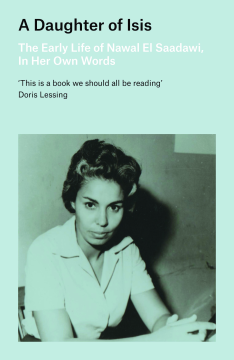
Additional Information
Book Details
Abstract
‘Against the white sand, the contours of my father's body were well defined, emphasized its existence in a world where everything was liquid, where the blue of the sea melted into the blue of the sky with nothing between. This independent existence was to become the outer world, the world of my father, of land, country, religion, language, moral codes. It was to become the world around me. A world made of male bodies in which my female body lived.'
Nawal El Saadawi is one of the greatest writers to come out of the Arab world. Born in a small Egyptian village in 1931, her life and writings have shown an extraordinary strength of character and a unique ability to create new worlds in the fight against oppression. Saadawi has been pilloried, censored, imprisoned and exiled for her refusal to accept the oppressions imposed on women by gender and class. Still, she continues to write.
A Daughter of Isis is the first part of this extraordinary woman’s autobiography. In it she paints a sensuously textured portrait of the childhood that produced the freedom fighter: from the trauma of female genital mutilation at seven years old to eluding the grasp of suitors at the age of ten. We see how, as a young adult qualifying, against the odds, as doctor, she moulded her own creative power into a weapon – and how her use of words became an act of rebellion against injustice.
'This is a book we should all be reading'
Doris Lessing
'I think her life has been one long death threat. At a time when nobody else was talking, she spoke the unspeakable.'
Margaret Atwood, BBC Imagine
'As I finished reading Dr. Nawal's autobiography I felt a sudden sense of loss. I didn't want to leave her. I went back and read the last sections again, and then again, until I remembered how many other books she has written. Then I felt delight that I will be able to return to her words and to her stories, and that so many others will share in them.'
Bettina Aptheker
'In this book we see how, from an early age, Saadawi combines her love of the Arabic language with her awareness of gender-based oppression to create texts which are as subversive as they are moving.'
Modern African Studies
Nawal El Saadawi is an internationally renowned writer, novelist and fighter for women’s rights both within Egypt and abroad. She holds honorary doctorates from, among others, the universities of York, Illinois at Chicago, St Andrews and Tromso as well as Universidad Nacional Autónoma de México. Her many prizes and awards include the Premi Internacional Catalunya in 2003, the Council of Europe North–South Prize in 2004, the Women of the Year Award (UK) in 2011, the Sean MacBride Peace Prize (Ireland) in 2012, and the French National Order of Merit in 2013. Her books have been translated into over forty languages worldwide. They are taught in universities across the world.
Table of Contents
| Section Title | Page | Action | Price |
|---|---|---|---|
| Cover | Cover | ||
| Half Title | i | ||
| About the author | iii | ||
| Title Page\r | v | ||
| Copyright\r | vi | ||
| Contents | vii | ||
| Preface: The Gift\r | 1 | ||
| 1: Allah and McDonald’s\r | 16 | ||
| 2: The Cry in the Night\r | 20 | ||
| 3: God Above, Husband Below\r | 31 | ||
| 4: Thank God for Our Calamities\r | 39 | ||
| 5: Flying with the Butterflies\r | 46 | ||
| 6: Killing the Bridegroom\r | 54 | ||
| 7: Daughter of the Sea\r | 63 | ||
| 8: My Revolutionary Father\r | 78 | ||
| 9: The Lost Servant-Girl\r | 88 | ||
| 10: The Village of Forgotten Employees\r | 94 | ||
| 11: God Hid behind the Coat-Stand\r | 101 | ||
| 12: The Ministry of Nauseation\r | 107 | ||
| 13: Dreaming of Pianos\r | 117 | ||
| 14: To the Circus\r | 124 | ||
| 15: The Singing Man\r | 139 | ||
| 16: The Whiskered Peasant\r | 153 | ||
| 17: Uncles, Suitors and Other Bloodsuckers\r | 165 | ||
| 18: A Stove for My Mother\r | 178 | ||
| 19: Coming to Cairo\r | 184 | ||
| 20: The Long, Strong Bones of a Horse | 199 | ||
| 21: Love and the Hideous Cat\r | 216 | ||
| 22: Art Thieves\r | 224 | ||
| 23: Mad Aunts and Abandoned Babies\r | 228 | ||
| 24: The House of Desolation\r | 241 | ||
| 25: The Secret Communist\r | 251 | ||
| 26: Wasted Lives\r | 267 | ||
| 27: Cholera, Ageing and Death | 284 | ||
| 28: The Qur’an Betrayed\r | 297 | ||
| 29: British English and Holy Arabic\r | 304 | ||
| 30: The Name of Marx\r | 329 | ||
| 31: The Brush of History\r | 344 | ||
| Afterword: Living in Resistance\r | 350 |
